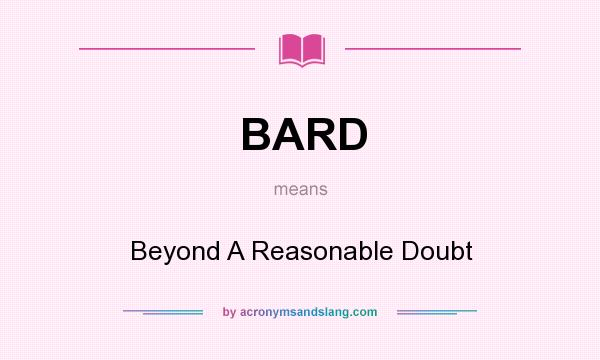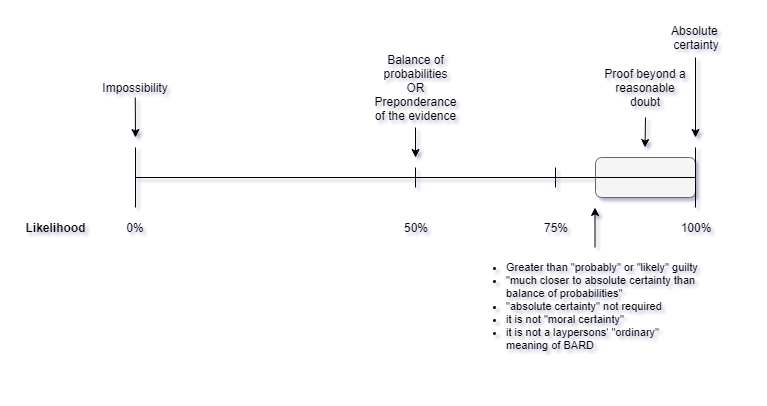

The reason for this is to ensure that "innocent people are never convicted". In cases where there is the uncorroborated testimony of the complainant, the BARD burden is one that has been described as "heavy" and "hard to discharge". The standard should be applied for the purpose of determining whether individual elements are proven beyond a reasonable doubt. The standard of BARD only applies to the evaluation of the evidence as a whole and not individual aspects of the evidence. “ reasonable doubt does not need to be based on the evidence it may arise from an absence of evidence or a simple failure of the evidence to persuade the trier of fact to the requisite level of beyond reasonable doubt.” Such as standard is "virtually impossible to prove" and "impossibly high" for the Crown to be held to such a standard. To know something with "absolute certainty" is to "know something beyond the possibility of any doubt whatsoever". The standard is more "than proof that the accused is probably guilty" in which case the judge must acquit. The burden of proof placed upon the Crown lies “much closer to absolute certainty than to a balance of probabilities.” However, belief that the accused is "probably guilty" is not sufficient and must acquit.

Proof beyond a reasonable doubt "it does not involve proof to an absolute certainty it is not proof beyond any doubt nor is it an imaginary or frivolous doubt." The presumption of innocence and the criminal standard of proof are mandated given that the accused faces "grave social and personal consequences" arising from conviction. The burden should never shift to the accused. The standard as the ultimate burden of proof is "inextricably intertwined with that principle fundamental to all criminal trials, the presumption of innocence". It is not based on "sympathy or prejudice". He can get the jury on your side! So if you need the best defense attorney, contact him today.The standard of "reasonable doubt" consists of a doubt based on reason and common sense which must be logically based upon the evidence or lack of evidence. We’ve given you the definition of guilty beyond a reasonable doubt, but he can use that in court. If You Need an Attorney, You Know Who to Callįinally, as you can see, attorney Mark Catanzaro really knows his stuff. They don’t have to convince the jury of a defendant’s innocence, only bring out the jury’s ambivalence and uncertainty about the defendant. They want to highlight other possible explanations. Instead, they want to poke holes in the prosecution’s argument. Therefore, the defense does not necessarily have to prove the defendant’s innocence.

Then, they want to show that the only reasonable explanation for what happened is that the defendant committed the crime. Instead, they first want to review what happened in the crime. Second, what does this mean for your case? It means that the prosecution does not necessarily need to positively prove the defendant committed the crime. Applying the Definition of Guilty Beyond a Reasonable Doubt Even if those possible explanations seem improbable. Other possible explanations for the crime exist that do not involve the defendant. In a criminal case, even if the accused seems “most likely guilty,” they should not be convicted. Definition of Guilty Beyond a Reasonable Doubtįirst, let’s define this phrase, “beyond a reasonable doubt.” Cornell Law School describes the idea this way: “the prosecution must convince the jury that there is no other reasonable explanation that can come from the evidence presented at trial.” Think of it in terms of a spectrum: Yet, at what point is guilt proven? Is it legal to convict someone of a crime if the court thinks they probably or likely did it? We’ll discuss all this and more as we give you the definition of guilty beyond a reasonable doubt. Thus, if someone accuses you of robbery, you’re considered innocent of robbery until the evidence proves your guilt. However, it’s necessary in this case to show the connection between this idea and “ innocent until proven guilty.” If you recall from last week, this phrase means that the court needs to assume the innocence of the accused until the facts prove their guilt. We’ve discussed what “beyond a reasonable doubt” means several times before, here and here.


 0 kommentar(er)
0 kommentar(er)
